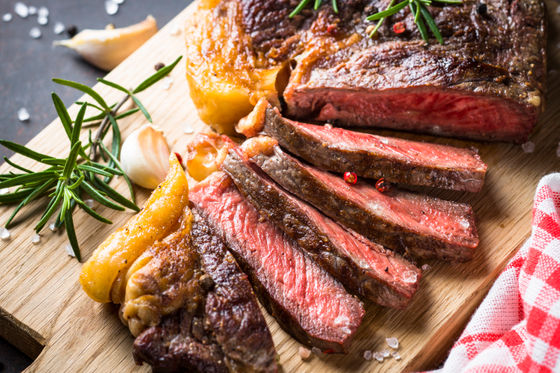Iron in red meat increases risk of type 2 diabetes by 26%

Processed meat is often cited as a food that is linked to the risk of type 2 diabetes, as
Integration of epidemiological and blood biomarker analysis links haem iron intake to increased type 2 diabetes risk | Nature Metabolism
https://www.nature.com/articles/s42255-024-01109-5
Heme iron and type 2 diabetes risk | News | Harvard TH Chan School of Public Health
https://www.hsph.harvard.edu/news/press-releases/significant-link-found-between-heme-iron-found-in-red-meat-and-other-animal-products-and-type-2-diabetes-risk/
Heme Iron From Meat Tied to Higher Diabetes Risk, Research Shows
https://www.verywellhealth.com/meat-type-2-diabetes-heme-iron-8699016
In a paper published in Nature Metabolism on August 13, 2024, a research team led by Fenglei Wang of the Harvard School of Public Health analyzed the relationship between heme iron contained in animal foods and type 2 diabetes.
Heme iron is the iron found in meat and fish that is highly absorbed, while the iron found in vegetables and other foods that is less easily absorbed is called non-heme iron.
Data used in the analysis included 36 years of dietary reports from 206,615 adults who participated in the Nurses' Health Studies I-II and the Health Professionals Follow-up Study of male healthcare workers, as well as records of the amount of different forms of iron they consumed (total iron intake, heme iron, non-heme iron, dietary iron, and iron from supplements).

The analysis found a significant association between high heme iron intake and risk of type 2 diabetes: Specifically, people with the highest heme iron intake had a 26% higher risk of developing type 2 diabetes compared with those with the lowest heme iron intake.
On the other hand, total iron intake or non-heme iron intake, whether from diet or supplements, was not significantly associated with type 2 diabetes risk.
The research team noted that heme iron explained more than half of the increased risk of type 2 diabetes associated with eating unprocessed red meat, and that heme iron accounted for a 'moderate' proportion of the risk of developing type 2 diabetes in some dietary patterns associated with type 2 diabetes.
This means that heme iron contributes to a significant proportion of the onset of type 2 diabetes, although it may not be the sole cause of the disease.
The researchers also analyzed blood samples from some of the participants, and 37,544 participants had metabolic biomarkers, while 9,024 participants had metabolic profiles. They found that higher heme iron intake was associated with higher values for metabolic disease and lower values for indicators beneficial to health.

Because this study only examined the correlation between non-heme iron and the risk of type 2 diabetes, it is not clear how iron in meat causes type 2 diabetes, but the researchers have proposed several hypotheses. For example, excessive iron, especially heme iron, may promote oxidation in the body, which may lead to damage to body tissues and an increased risk of developing type 2 diabetes.
In addition, people with a high intake of non-heme iron often ate the Mediterranean diet or the Dietary Supplement for Hypertension (
In other words, it is possible that the intake of heme iron directly led to type 2 diabetes, or that a diet that tends to increase the intake of heme iron indirectly caused lifestyle-related diseases, or both.

As the health effects of red and processed meat become more widely known, plant-based meat alternatives are becoming increasingly popular, but are often supplemented with heme iron to improve appearance and taste, making these findings important for dietary guidelines and public health strategies to prevent diabetes.
'This study highlights that healthy dietary choices are essential for diabetes prevention,' said Frank B. Hu, a nutritionist at the Harvard School of Public Health and corresponding author of the study. 'In particular, reducing heme iron intake from red meat and increasing the amount of plant-based diets may be an effective strategy to lower diabetes risk.'
On the other hand, there is no doubt that iron is an important nutrient for the body. Also, research has shown that eggs and chicken , which are also rich in heme iron, are not related to the risk of type 2 diabetes.
'My conclusion is that we should focus on incorporating a variety of plant-based foods into our diet, but also include moderate amounts of red meat as part of a balanced, healthy diet,' registered dietitian Mary Ellen Phipps told Verywell Health.
Related Posts:







